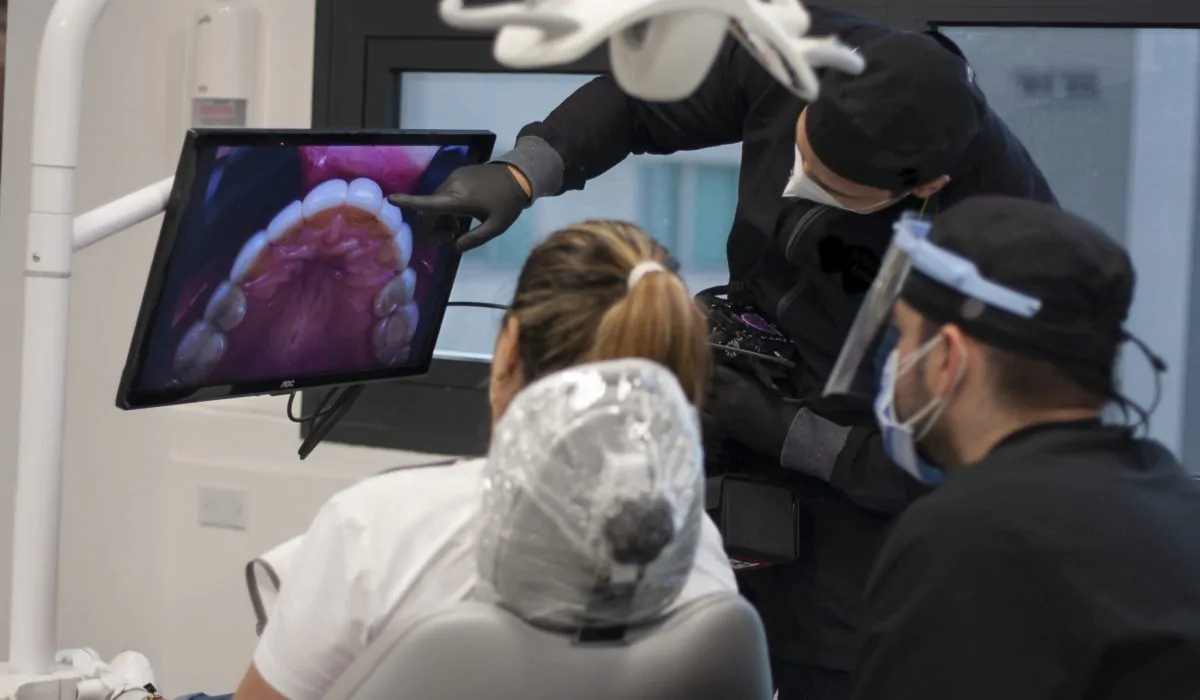Choosing the right tooth replacement option is crucial for oral health and confidence. Dental implants and dentures are two popular options for replacing missing or damaged teeth. The choice between these two effective treatment options, dental implants vs dentures, can be challenging, as each has its benefits and drawbacks.
Implant placement offers improved oral health, durability, and a natural-looking appearance. In contrast, dentures are a more affordable option to replace a full arch of teeth, but they require regular maintenance and can sometimes move around in the mouth.
In this blog post, we’ll compare dental implants and dentures and explore their benefits and drawbacks to help you make the right choice.

Table of Contents
ToggleSummary of the Content:
- Dental implants and dentures are two common tooth replacement options, each with benefits and drawbacks.
- The dental implant process is a long-lasting and natural-looking option, but they require surgery and can be expensive.
- Dentures are a more affordable option that can be taken out for cleaning, but they may feel less natural and need to be replaced over time.
- Implant-supported dentures are a hybrid option that combines the stability of implant surgery with the affordability of dentures.
- Ultimately, both treatments are effective treatment options for tooth loss, but the right option for patients depends on their oral health needs.
Dental Implants vs Dentures: Key Differences
Dental implants vs dentures are two of the most popular choices regarding tooth replacement options. While both options can effectively replace missing teeth, they differ in several ways. Let’s explore the key differences between implants and dentures.
How Dental Implants Work
Dental implants are a type of dental restoration that involves surgically placing a small, screw-like post into the jawbone to replace the lost tooth. The implant is an artificial tooth root that supports a dental crown, custom-made to match the surrounding teeth.
The implant process involves several stages, starting with a consultation to assess your eligibility for the procedure. Once you’re cleared for treatment, a titanium post is implanted into the jawbone. The post will eventually fuse with the bone, creating a stable foundation for the dental crown. After full osseointegration of the implant, the crown is attached to the post, creating a natural-looking, functional tooth replacement.
Implants can also be used with other tooth restoration options, such as snap-on dentures or dental bridges.
Understanding Dentures and Their Components
Dentures are removable prosthetic devices that can replace multiple missing teeth. They’re an alternative treatment for implants made of acrylic porcelain and can be held in place using adhesives or clasps. Several types of dentures are available, including full and partial dentures, which replace all or some missing teeth.
The process of getting removable dentures involves several appointments with your dentist. During these visits, impressions of your mouth are taken to create a custom-fitted denture that matches your gums and surrounding teeth.
Pros and Cons of Dental Implants: A Detailed Analysis
Dental implants are a popular tooth replacement option that offers numerous benefits. However, they’re not suitable for everyone, and there are potential challenges.
The Advantages of Choosing Dental Implants
- Improved oral health:
The dental implant process helps maintain the structure and strength of the jawbone, preventing bone loss that can occur with missing teeth. - Durability:
Dental implants are a long-term option that can last for many years, sometimes up to 25 years or more, with proper dental care. - Natural-looking appearance:
Dental implants are designed to blend in seamlessly with your natural teeth, creating a more natural-looking smile. They can also restore facial harmony and symmetry. - Improved comfort:
Dental implants are a fixed tooth replacement option, which means they don’t move or shift around in the mouth, offering better comfort than removable dentures. - Improved chewing function:
Dental implants function like natural teeth, allowing you to eat your favourite foods without restrictions.
Potential Challenges of Dental Implants
- Cost:
Implant surgery can be an expensive treatment option, especially if multiple implants are needed. - Time-consuming process:
The dental implant process can take several months from start to finish, including time for the implant to integrate with the jawbone. - Surgery risks:
As with any surgery, there are risks involved with dental implant placement, including infection, nerve damage, and implant failure. Some people may even need additional surgeries, like bone grafting or a sinus lift, to stimulate bone growth, which also pose risks. So clear things out with your dentist before surgery. - Eligibility:
Only some people are suitable for dental implants. They require adequate jawbone density and healthy gum tissue. Individuals suffering from active gum disease and tooth decay need to seek treatment before getting oral surgery. - Maintenance:
Dental implants require proper daily care and maintenance, including regular check-ups and cleanings, to make them last a long time.
Embracing Denture Care: The Good and the Bad
Dentures are a common tooth replacement option that has been around for decades. While they may not offer the same benefits as dental implants, there are still denture advantages to consider.
The Positive Aspects of Dentures
Here are some denture advantages:
- Affordability:
One of the primary denture advantages is that they’re more affordable than dental implants, making them a popular choice for those on a budget. - Accessibility:
Dentures are widely available and can be made relatively quickly, making them a good option for those who need a tooth replacement quickly. - Non-invasive:
Unlike dental implants, dentures do not require surgery or invasive procedures. - No recovery time:
With dentures, there’s no recovery time required, and patients can begin using them immediately after they’re fitted.
Common Concerns with Dentures
Here are some common concerns people have with dentures:
- Comfort:
Complete dentures can be uncomfortable and cause irritation or soreness, especially when not fitted properly. - Slippage:
Dentures can slip or move around in the mouth, which can be uncomfortable and embarrassing. - Maintenance:
Dentures require special care and maintenance to prevent infection. - Speech impediments:
Some patients may experience difficulty pronouncing certain words with dentures. - Limited diet:
Dentures may have dietary restrictions and limitations, as they may not be able to handle certain foods. Additionally, upper dentures may limit your ability to taste because they cover the palate.
While dentures may not offer all the benefits of dental implants, they remain a popular choice for tooth replacement. Patients can make an informed decision about their tooth replacement options by understanding the positive aspects of dentures and their common concerns.
Comparing Zirconia and Titanium Dental Implants
When choosing between these two materials, it’s essential to understand the differences between titanium and zirconia to make an informed decision. Here’s a comparison of the properties of zirconia and titanium implants:
- Composition:
Titanium dental implants are crafted from biocompatible metal, while zirconia implants are made of ceramic material. Titanium is known for its durability and flexibility, while zirconia is known for its biocompatibility and aesthetic appeal. - Colour:
Titanium implants are metallic silver, while zirconia implants are white. Zirconia blends in naturally with the surrounding teeth, making them a popular choice for front teeth. - Strength:
Titanium is poplar for its strength, making them suitable for use in high-stress areas, such as the back molars. Zirconia is also strong but not as strong as titanium. Zirconia better suited for use in the front teeth and areas of low to moderate stress. - Biocompatibility:
Both titanium and zirconia implants are biocompatible, meaning they’re not harmful to living tissue and are well-tolerated by the body. However, zirconia is known to be more biocompatible than titanium and may be a better choice for patients with metal allergies or sensitivities. - Osseointegration:
Osseointegration is the process of implants fusing with the jaw bone over time. Titanium implants have a proven track record of successful osseointegration, while the research on zirconia implants, although promising, is still limited. - Manufacturing:
Titanium implants are manufactured using a machining process, while zirconia dental implants are made using a computer-aided design and manufacturing (CAD/CAM) process. This allows for greater precision and customisation in the design of zirconia implants. - Longevity:
While titanium and zirconia implants have shown long-term success rates in dental implant procedures, titanium implants have a longer track record with over 50 years of use in dentistry. The longevity of zirconia implants is still being studied, but initial research suggests they may also have a long lifespan with proper care and maintenance.
Implant-Supported Dentures: A Hybrid Solution
For patients who want the stability of dental implants but prefer the affordability of dentures, implant-supported dentures can be a great hybrid solution.
How Implant-Supported Dentures Work
Implant-supported dentures are secured in place with dental implants. The tooth implants are placed into the jaw bone, and the prosthetic teeth are attached to the implants with an abutment. The result is a more stable and secure fit, as the dentures are anchored into the jawbone.
Weighing the Benefits and Drawbacks
Implant-supported dentures are a viable option for people who have lost their teeth. They have benefits and drawbacks, so it is important to weigh them carefully before deciding.
Dental Implant Benefits:
Here are some dental implant benefits:
- Stability:
Implant-supported dentures are anchored in the jawbone with implants. They are more stable and secure than traditional dentures, - Improved function:
With a more secure fit, patients can eat, talk, and smile confidently, as implant-supported dentures feel more like natural teeth. - Reduced bone loss:
Dental implants help preserve the jawbone, preventing bone loss that can occur with traditional dentures. - Longevity:
Implant-supported dentures are a long-lasting tooth replacement option. With proper care and maintenance, the implants can last for 25 years while the implant dentures can last up to 20 years.
Drawbacks of Implant-Supported Dentures
Here are some of the cons of implant-supported dentures:
- Cost:
Implant-supported dentures are a more expensive option than traditional dentures, as they require dental implants to be placed. - Surgery:
Placing dental implants requires surgery, which can be uncomfortable and requires a recovery period. - Maintenance:
Implant-supported dentures require proper care and maintenance to prevent infection and other oral health issues. - Time-consuming:
Getting implant-supported dentures can take several months, as dental implants need time to fuse with the jaw bone before the dentures can be attached.
It’s important to note that the dental implant benefits far outweigh their drawbacks. They’re a long-term investment in oral, physical, and mental health that will last you up to 25 years or more with good care.
Implant-supported dentures can be a great treatment option for those who want the stability of implants but prefer the affordability of dentures. By understanding how they work and weighing the benefits and drawbacks, patients can make an informed decision about their tooth replacement options.
Dental Implants and Dentures: A Look at the Procedures
Both dental implants and dentures require a process to be installed, but the procedures differ. In this section, we’ll look closer at the journey of getting dental implants or dentures.
The Dental Implant Journey
Dental implants require a surgical procedure that involves several steps. Here’s a brief overview of the process:
- Consultation:
Before getting dental implants, you’ll need a consultation with an implant dentist. During the consultation, your dentist will evaluate your oral health, take X-rays, and determine whether you’re a suitable implant candidate. - Implant placement:
If you’re deemed eligible for dental implants, the next step is to place the implant into your jawbone. The implant is made of titanium and is shaped like a screw. It’s inserted into the bone and left to heal and fuse with the bone for several weeks or months. - Abutment placement:
An abutment is attached after the implant has integrated with the bone. The abutment is a connector that joins the implant to the artificial tooth. - Restoration placement:
The final step is placing the artificial tooth or crown onto the abutment. The crown is custom-made to match natural teeth and is fixed onto the abutment.
Getting Your First Set of Dentures
Getting dentures also involves a process, but it is less invasive than getting dental implants. Here’s what you can expect:
- Consultation:
You’ll start by consulting with a dentist. During the consultation, they will examine your mouth and take impressions of your teeth and gums. - Fitting:
After your impressions are taken, your dentist will make a mould your mouth and send it to the lab. Dental technicians will use the mould to create your dentures, which will be custom-made to fit your mouth. - Adjustment:
Once your dentures are ready, you’ll have a fitting appointment with your dentist. Your dentist will adjust the false teeth during this appointment for a comfortable fit for your entire arch. - Ongoing care:
It’s important to take good care of your false teeth to make them last for many years. Your dentist will provide instructions on cleaning and caring for your prosthetic teeth. You’ll also need regular checkups to monitor that your dentures continue to fit well and identify any problems early on.
Eating and Speaking with Dental Implants and Dentures
When it comes to eating and speaking, choosing between dental implants vs dentures can impact your everyday life differently. Here’s what you need to know.
Adjusting to Life with Dental Implants
It can take time to adjust to the implant and crown on top. Here are some things to keep in mind:
- In the first few days after surgery, stick to a soft diet. Hard or crunchy foods may damage the implant procedure or irritate the surgical site.
- Discomfort or mild pain after the procedure is normal, but this should subside within a week or two. If you experience any severe pain or bleeding, contact your dentist immediately.
- Once the surgical site has completely healed, you should be able to speak and eat normally without any issues.
Tips for Eating and Speaking with Dentures
Wearing conventional dentures can take some getting used to, but with a few tips and tricks, you can make the adjustment period a little smoother. These are some things to keep in mind:
- Start with soft foods:
When you first get your dentures, stick to soft, easy-to-chew foods like mashed potatoes, soups, and scrambled eggs. As you become more comfortable, you can gradually add in harder foods. - Avoid sticky or hard foods.
To prevent damage to dentures, avoid sticky or chewy foods that can dislodge or damage them and hard and crunchy foods that can exert excessive pressure and cause fractures. You can cut your food up into smaller pieces for easier chewing. Additionally, steer clear of foods with small seeds or grains that can become lodged under dentures, and be cautious with extreme temperatures and activities that require excessive force. - Practice speaking:
Talking with dentures may take some practice. Start by reading aloud or practising in front of a mirror to get used to the feeling. - Use adhesive:
Consider using a denture adhesive to prevent your partial dentures from shifting out of place when you eat or speak.
Dental Implant and Denture Maintenance
Maintaining good dental hygiene is crucial for both dental implants and dentures. Here are some care tips for healthy teeth:
Caring for Your Dental Implants
- Brush twice daily and floss at least once daily:
Use a soft-bristled toothbrush to clean your adjacent teeth and implants. - Use a non-abrasive toothpaste:
Avoid using abrasive toothpaste or mouthwash, as they can scratch the surface of your dental implants and create tiny crevices that can trap bacteria. - Visit your dentist regularly:
Seeing your dentist for regular checkups and cleanings is important to monitor that your healing process goes smoothly and to help keep your implants in good condition.
Denture Cleaning and Storage
- Rinse after eating:
Take out your dentures and rinse them with water to prevent food particles from getting stuck in your implant dentures. - Brush your dentures daily:
Use a soft-bristled toothbrush and mild soap or cleaner. Avoid using abrasive materials that can scratch the surface of your dentures. - Soak your dentures:
Soaking your dentures overnight can help eliminate stains and bacteria. Use a denture cleaner or a mixture of water, vinegar, or baking soda to soak your dentures. - Store your dentures properly:
Keep your dentures moist when not in use to prevent warping or cracking. Store them in water or a denture solution recommended by your dentist. Avoid using hot water, which can cause them to warp.
Dental Implants, Dentures, and Your Overall Health
Regarding tooth replacement options, the impact on your overall health and well-being is an important consideration.
The Impact of Tooth Loss on Your Well-being
Tooth loss can have a significant impact on overall well-being. Here are some key aspects of how tooth loss can affect individuals:
- Aesthetics and Self-Esteem:
Missing teeth can alter a person’s smile and facial appearance, leading to self-consciousness and negatively impacting self-esteem. The visible gaps can make individuals self-conscious about their appearance, affecting their confidence in social interactions and overall well-being. - Speech and Communication:
Teeth play a vital role in proper speech and pronunciation. Tooth loss can make it challenging to articulate certain sounds and words correctly, leading to difficulties in communication. This can cause frustration, embarrassment, and a reluctance to engage in conversations, impacting overall well-being and social interactions. - Chewing and Nutrition:
Missing teeth can impair a person’s ability to chew and properly break down food. This can result in dietary restrictions, as individuals may avoid certain foods that are difficult to chew, such as raw vegetables or tougher meats. Inadequate nutrition can harm overall health and well-being, affecting energy levels, immune function, and overall quality of life. - Oral Health Issues:
Tooth loss can contribute to various oral health issues. The remaining teeth may shift or become misaligned, leading to bite problems, jaw pain, and further tooth loss. The gaps left by missing teeth can also create spaces for food debris to accumulate, increasing the risk of gum disease, decay, and bad breath. These oral health issues can cause discomfort, affect daily functioning, and harm well-being. - Psychological and Emotional Impact:
Tooth loss’s physical and functional implications can also have psychological and emotional effects. Individuals may experience anxiety, depression, and a diminished sense of well-being due to changes in their appearance, limitations in activities, and the impact on their overall self-image.
How Dental Implants and Dentures Affect Your Health
Implants and dentures positively affect your overall health, such as the improved ability to eat and speak and increased confidence and self-esteem.
However, each option has unique considerations, such as the need for surgery with implants and the potential discomfort or sores with traditional dentures.
Seeking Professional Advice: Choosing Between Dental Implants and Dentures
Seeking the advice of a dental professional is crucial to making an informed decision.
The Importance of a Thorough Consultation
A thorough consultation with your dentist is essential before deciding whether to choose dental implants or dentures. During the consultation, your dentist will evaluate your oral health and recommend the appropriate option. They will also provide detailed information about the procedures, including aftercare, potential risks, a timeline, and a cost estimate.
Questions to Ask Your Dental Professional
Here are some questions you may want to ask your dentist to help you make a decision:
- What are the advantages and disadvantages of dental implants and dentures?
- How long do dental implants or dentures last?
- What is the recovery time for implant surgery?
- How do I care for my implants or dentures?
- What are the costs associated with implants or dentures, and do health funds cover any expenses?
- How will implants or dentures impact my daily life, including eating, speaking, and social interactions?
Final Thoughts
Choosing between these replacement teeth options, dental implants vs dentures, is a major decision that can impact your dental health, overall well-being, and quality of life. While both options offer benefits, it’s essential to consider their pros and cons carefully.
Dental implants provide a more natural look and feel and offer superior stability, durability, and comfort, but they require a more invasive dental procedure and a longer recovery. Conversely, dentures are removable and often more affordable, but they may need to be adjusted or replaced regularly.
Ultimately, the choice depends on your needs, budget, and lifestyle. That’s why seeking professional advice from a dental professional is crucial.
At Smiles in Currambine, our team of dentists can help you make an informed decision based on your unique situation. Schedule a consultation with us today and take the first steps towards a healthier, happier smile!

Dr Saket Rai
Dr. Saket Rai is a passionate dentist with over 15 years of experience in general dentistry. He specializes in dental implants, wisdom teeth removal, laser dentistry, cosmetic dentistry, and Digital Smile Design. With a Bachelor of Dental Surgery degree and a Masters in Forensic Odontology, he stays updated with the latest dental technology and techniques. Dr. Rai has extensive training in dental implants and believes in continuous professional development to provide the highest standard of care. Outside of dentistry, he enjoys spending time with his two boys and has interests in reading, documentaries, and cricket.








